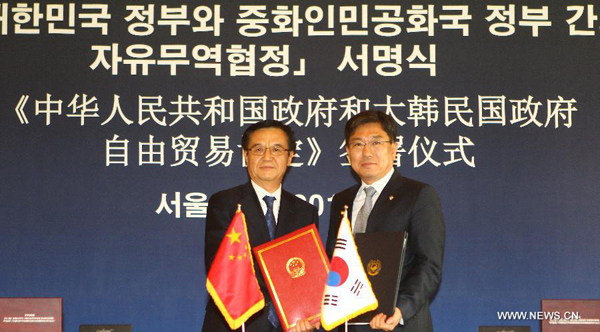

 |
| Chinese Commerce Minister Gao Hucheng (L) shakes hands with his South Korean counterpart Yoon Sang-jick after signing the agreement in Seoul, June 1, 2015. (Xinhua/Yao Qilin) |
After 10 years of preparation and 14 rounds of negotiations, China and South Korea signed a bilateral free trade agreement (FTA) in Seoul on June 1, 2015. The signing of the FTA represents a milestone in the cooperation between the two countries.
Under the accord, after a transitional period, South Korea will eliminate tariffs on 92 percent of all products from China, while China will abolish tariffs on 91 percent of all imported South Korean goods.
At the signing ceremony, Chinese Commerce Minister Gao Hucheng said: "This China-South Korea FTA is a high level, comprehensive and balanced free trade agreement. It's the largest deal for China in terms of trade volume and it's a deal that covers the widest fields." Yoon Sang-jick, his South Korean counterpart, said that The FTA will make the economic ties between South Korea and China closer. It will provide enormous opportunities for future development of business from both countries and our respective economies.
What outstanding features does this FTA have? Wang Shouwen, Vice Minister of China's Ministry of Commerce explained to People's Daily:
Firstly, China is the world biggest trading country and South Korea ranks seventh. The trade volume between the two countries was about 300 billion dollars in 2014, accounting for 29 percent of the total trade volume of APEC countries. Following the signing of the FTA and the transitional period, tariffs will be eliminated for over 90 percent commodities in bilateral trade.
Secondly, the FTA between China and South Korean covers 17 fields, including, traded goods, e-commerce, competition policies, government procurement, intellectual property protection, and environmental protection.
Thirdly, in traded goods, China liberalizes 91 percent of tariffs covering 85 percent of import value, while South Korea liberalizes 92 percent of tariffs and 91 percent of import value. In the fields of service and investment, China and South Korea have also reached a balance in give and take.
Entrepreneurs and investors of both countries will be eligible for two-year residency and work permits in each other's country. According to Wang Shouwen, in bilateral trade, intermediate products account for 72 percent and capital goods account for 18 percent. After the signing of the FTA, 86 percent of the tariffs for intermediate products will be eliminated and 99 percent of the tariffs for capital goods will be eliminated, which will mean a sharp decline in business costs in both countries.
South Korea expects the bilateral FTA to raise its real GDP by 0.96 percentage points and create 53,800 new jobs in the next 10 years. It is forecast that the FTA will help South Korean companies to make inroads into the world's largest consumer market.
"We encourage companies to use the tariff cuts to send more Chinese exports to South Korea, including small home appliances, daily goods, and machinery. Those products will be warmly welcomed in South Korea. Other areas such as automobiles are not included in the deal. But we have made progress in the investment and service sectors," said Enna Park, counselor of Embassy of the Republic of Korea in China.
The article is edited and translated from《中韩超九成商品将迎来“零关税”时代》, source: People's Daily, author:Chen Shangwen and Wan Yu.
 J-11 fighters in air exercise
J-11 fighters in air exercise Beauties dancing on the rings
Beauties dancing on the rings Attendants-to-be join Mr. & Miss Campus Contest
Attendants-to-be join Mr. & Miss Campus Contest Beijing's toughest anti-smoking law takes effect
Beijing's toughest anti-smoking law takes effect Family lives in cave for about 50 years in SW China
Family lives in cave for about 50 years in SW China PLA soldiers operating vehicle-mounted guns in drill
PLA soldiers operating vehicle-mounted guns in drill Blind carpenter in E China's Jiangxi
Blind carpenter in E China's Jiangxi China hosts overseas disaster relief exercise for the first time
China hosts overseas disaster relief exercise for the first time 20 pairs of twins who will become flight attendants in Sichuan
20 pairs of twins who will become flight attendants in Sichuan Obama is sowing discontent in S.China Sea
Obama is sowing discontent in S.China Sea Rescuers work through night to reach cruise ship survivors
Rescuers work through night to reach cruise ship survivors Driving through limbo
Driving through limbo Facing down MERS
Facing down MERSDay|Week